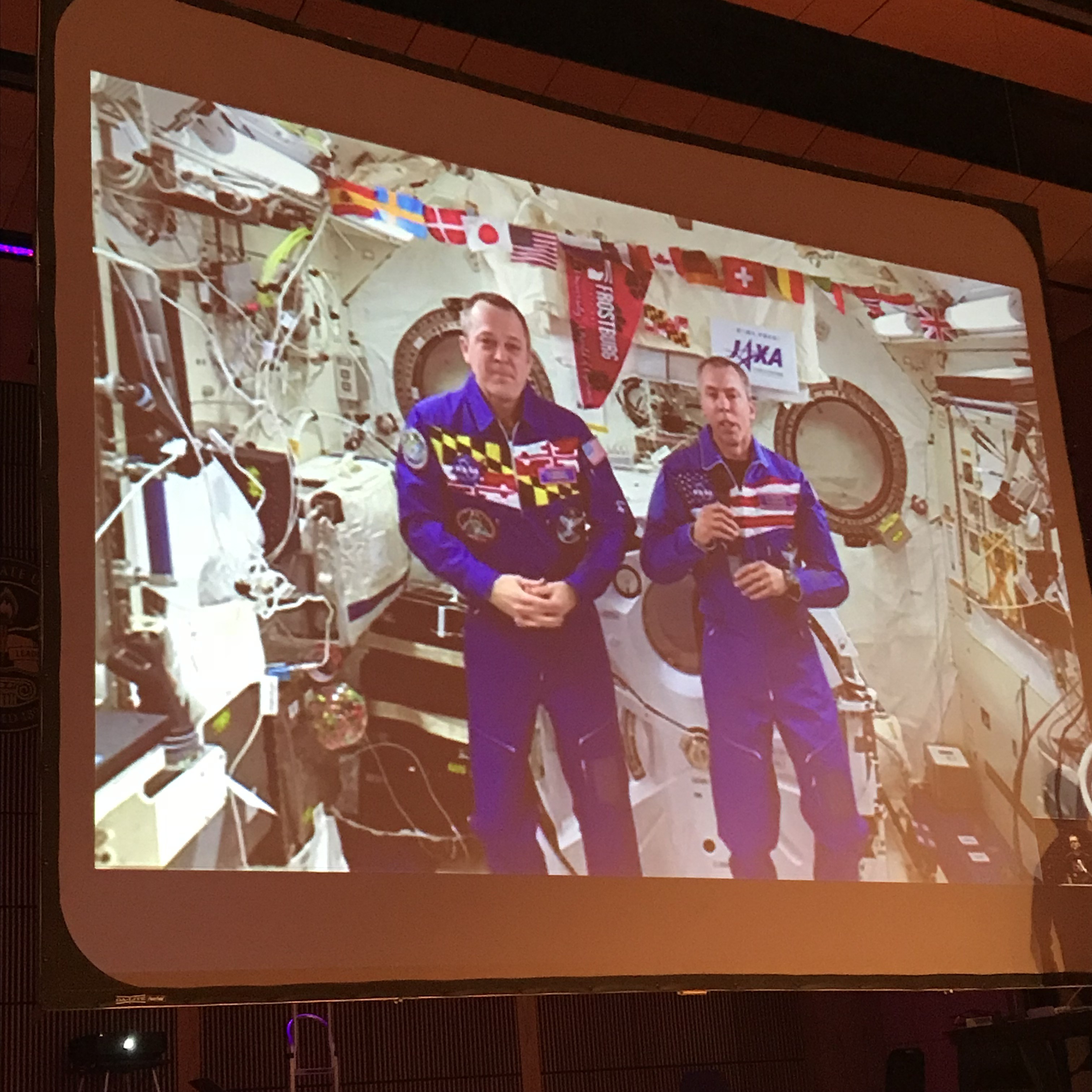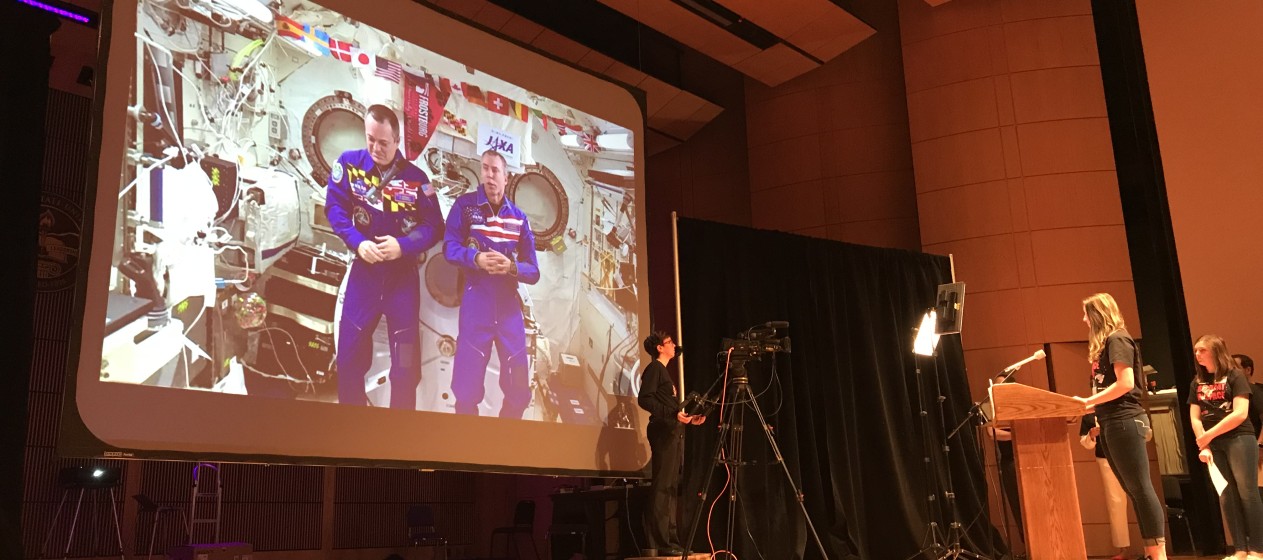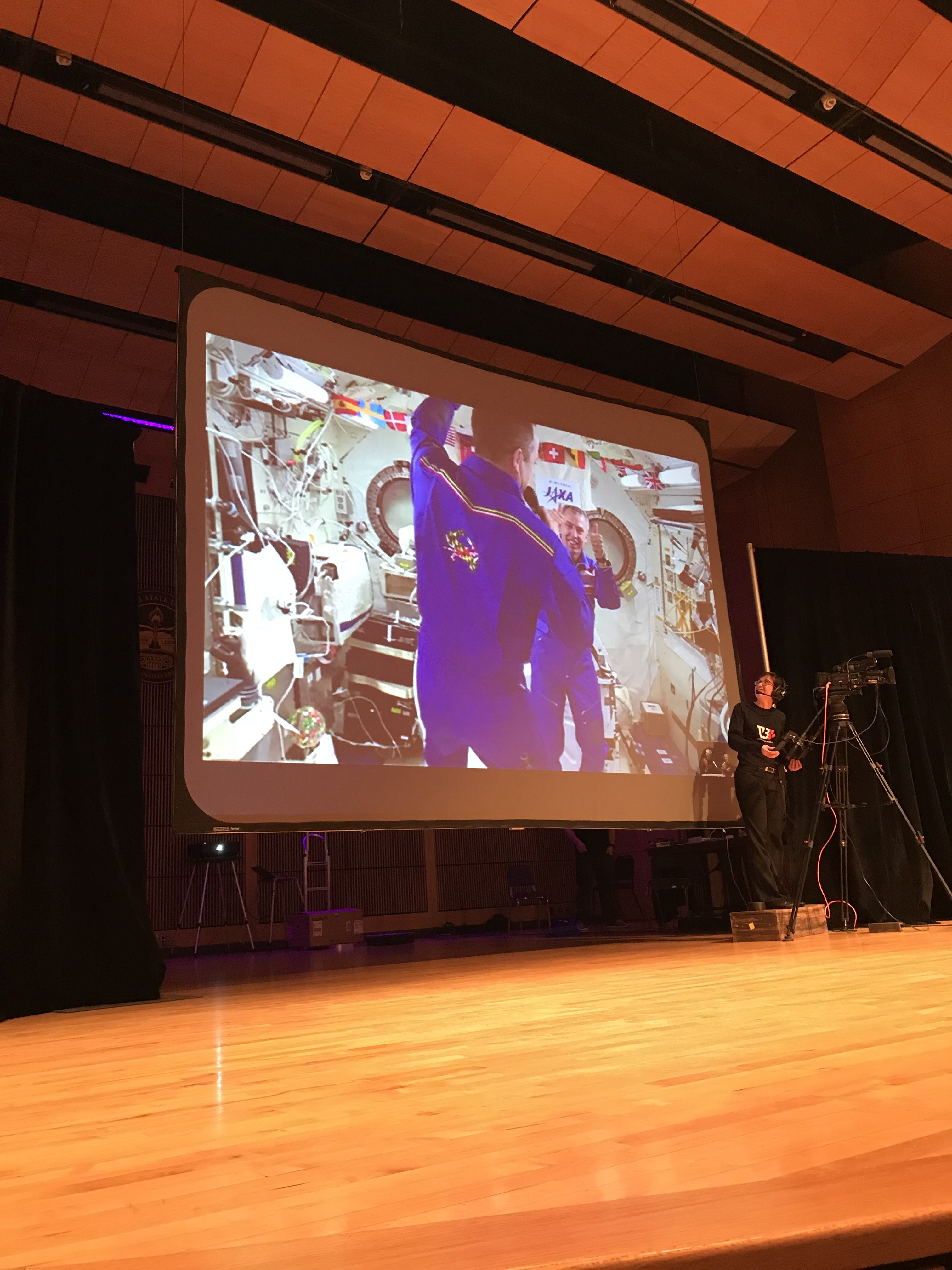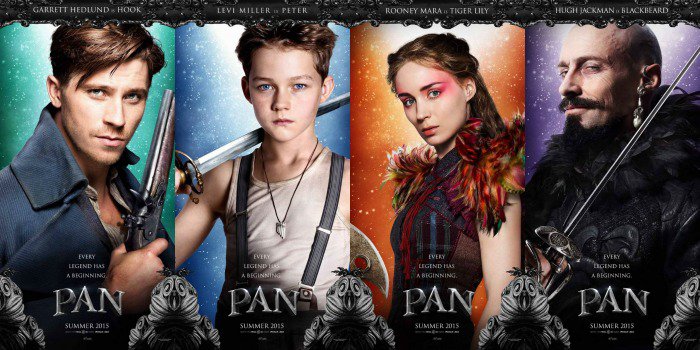World Traveling Teacher Turned Space Bound Astronaut
“Station, this is Frostburg State University. How do you hear me?,” Frostburg State University president Ronald Nowaczyk asked as he made connection with NASA on April 9, now known as Ricky Arnold Day.
Frostburg State University celebrated it’s 120th anniversary in a memorable manner – with a call to space. Over 1,200 middle school students flooded the campus this past Monday for a day filled with space-based activities. The Lane University Center, the Gira Center (CCIT), and Frampton were overtaken by different space-themed activities. The wide-eyed middle school students were from Garrett, Allegany, and Mineral counties and had the opportunity to participate in STEM projects, space literacy, and space-picture drawing, among other activities provided by more than 100 students in the College of Education and faculty members.
In 1898, the Maryland General Assembly and Governor Lloyd Lowndes created State Normal School #2. Six years later, the University held it’s first commencement as students graduated with a lifetime teaching certificate. Prior to life with airplanes and broadcast media, President Nowaczyk wonders what those who created the school would have been thinking if they had experienced the 120th anniversary with the current faculty and student body in the manner that they did. President Nowaczyk noted in his opening speech that some of the students in the audience will be traveling to space and have the ability to experience what Arnold is currently experiencing.
A 1985 graduate of Frostburg State University, Maryland native Ricky Arnold earned his Bachelor of Science degree before returning to complete his teaching certification in 1988. He then went on to earn a Masters of Science in Marine, Estuarine, and Environmental Science from the University of Maryland in 1992. As a child, Arnold loved baseball and was fascinated by space and water, which essentially sparked his latest endeavor. Prior to being selected by NASA in May 2004 as a mission specialist, Arnold was employed as an Oceanographic Technician by the United States Naval Academy in 1987. Educating students proved to be his true passion as he traveled around the world to teach at International Schools in Morocco, Saudi Arabia, Indonesia, and Romania. He also has experience as a science teacher at John Hanson Middle School in Waldorf, Md.

After teaching across the globe, Arnold was selected by NASA in 2004 as one of the first Educator Astronauts. The program is a renewal of the program that began with Teacher in Space Christa McAuliffe, whose life was lost in the 1986 Challenger incident. Now, in 2018, Arnold is a part of NASA’s Year of Education on Station. The program is centered around the lesson plans that McAuliffe created, but never got to teach. Arnold is currently one of two teachers abroad this year. Joe Acaba, a California native, is the other teacher to take part in the program
The six-person crew on Expedition 55, the 55th expedition to the International Space Station, have the tasks of studying Earth’s atmospherics, the effects of microgravity on bone growth, materials’ responses to space environments, and biological samples’ responses to stimulated gravity. Russia, the United States, and Japan are the countries represented on the expedition.
At 9:55 a.m. Monday, April 9th, Frostburg students and local middle schools had the opportunity to speak with Arnold via a live downlink from the International Space Station where Arnold is in the early period on his six-month mission. The questions came from a mix of FSU professors, students from the College of Education, local middle school students, and teacher education students from Bowie State University and the University of Maryland, College Park. The questions covered a broad range of topics stemming from education to what food in space is like. Arnold was joined by fellow astronaut Drew Feustel.
Feustel is a Michigan native and was selected by NASA in 2000. He obtained his PhD in Geological Sciences specializing in Seismology from Queen’s University in Kingston, Ontario, Canada in 1995. He is a veteran of two spaceflights.
President Nowaczyk introduced Arnold by highlighting that thirty years ago, Arnold was teaching secondary school biology, and students skipped study hall to watch his lectures, showing how well-respected Arnold was in the front of the classroom.
Appearing on the screen in his NASA uniform with the Maryland state flag across his chest, Arnold was ready to field questions.
Students asked questions about his inspiration to becoming an astronaut, his experiences at Frostburg, things they do for entertainment, and how they prepared for launch.
Jake Nowaczyk asked Feustel about the types of food that are eaten in space. Feustel mentioned three types of food that the astronauts can consume: thermally stabilized food that is similar to military rations, rehydrated food, and some off-the-shelf food, such as chocolate coated candies. Chocolate coated candies were then in the forefront as the students got to see the effects of microgravity as the candies floated before the astronauts. In a later answer, Feustel mentioned that eating is one of the biggest challenges they face on the ISS, as the astronauts must use their mouth to chase around the food. Arnold also added that food in space does taste similar to food on Earth as long as seasoning and Tabasco are used.
Danielle Ferris, a junior early childhood education major at Frostburg State, asked Arnold why he felt it was necessary to finish McAuliffe’s missions. Arnold noted that he believes in a strong sense of mission and completion, and it had bothered him that the mission was not completed. Ferris said that she had wanted to know “why he was the first person to want to complete her lessons.”
In another question, Feustel got into the details of their exercise routine on the ISS. Chuckling, Feustel said that he had not consistently worked out on Earth, but in space he spends around 45 minutes a day on the treadmill and a few hours on the resistance exercise device. Senior athletic training major, Lauren Pettyjohn-Robin, asked the question because she “wanted to know the physiological effects space has on a person’s abilities.”
Throughout the communication, Arnold credited the investment of the Frostburg teaching community for setting him on the right path. In response to a question asked by Dr. Sally Stephenson, a professor of early childhood education at Frostburg State, Arnold acknowledged his overseas teaching experience in helping him prepare for his role as an astronaut. He noted that Feustel and himself were actually speaking to the audience in the Japanese station in the ISS and that teaching abroad gave him a “respect for culture, languages, and ideas.”
In regard to his experience as a teacher in general, Arnold said it gave him strength he would not have otherwise. He noted that he has the ability now to juggle with ease a bunch of different people, which helps translate to his role as an astronaut because he works with others from around the world.
Chandler Sagal, a senior exercise and sport science major at Frostburg State, asked a question written by a student at Bowie State University that inquired about the astronauts’ preparation outside of their training. Feustel answered, noting that they both have been away since October and the biggest thing to prepare for was leaving home. In response to another question, Feustel said that the astronauts are allowed to bring anything as long as they fit the requirements of being small, low in mass, and low in volume. For example, Arnold brought along a baseball and Feustel brought a small stuffed mole. Drawing laughter from the audience, Feustel showed the students what they do for entertainment in space as he slowly flipped himself upside down, and Arnold handed him a guitar.
Arnold offered up his advice to those pursuing their dreams, saying, “you owe it to yourself to try” and that “no dream is really too absurd. If someone tells you that you can’t, try your best to prove them wrong.” He expressed his gratitude toward his career as a teacher, noting that it is really rewarding to develop personal relationships with students. He told aspiring teachers to always work really hard, make advancements, and remember that time and energy are the most important resources.
Arnold made reference to Fred Flintstone, as he drew a similarity between himself and the animated character in both their passions to exploring what is beyond the known. He said that he was inspired to become an astronaut through science fiction TV shows and is “intrigued by the idea of travelling beyond.”
As time concluded, Arnold said he is proud to be a product of Frostburg State University and Maryland public schools. Before exiting, Arnold turned around to show the students the Maryland state flag-filled crab that is on the back of his uniform. Leaving in dramatic fashion, Arnold and Feustel exited the screen by floating upward to applause by the in-awe students and all those in attendance.
Pettyjohn-Robin said the experience was important for all students at Frostburg, noting that it shows when an “individual graduates from Frostburg, they can do things on an international scale.”
Education is an experience that can truly take you out of this world, and Arnold surely showed that Frostburg is more than one university. It gave him an out-of-this-world experience.





